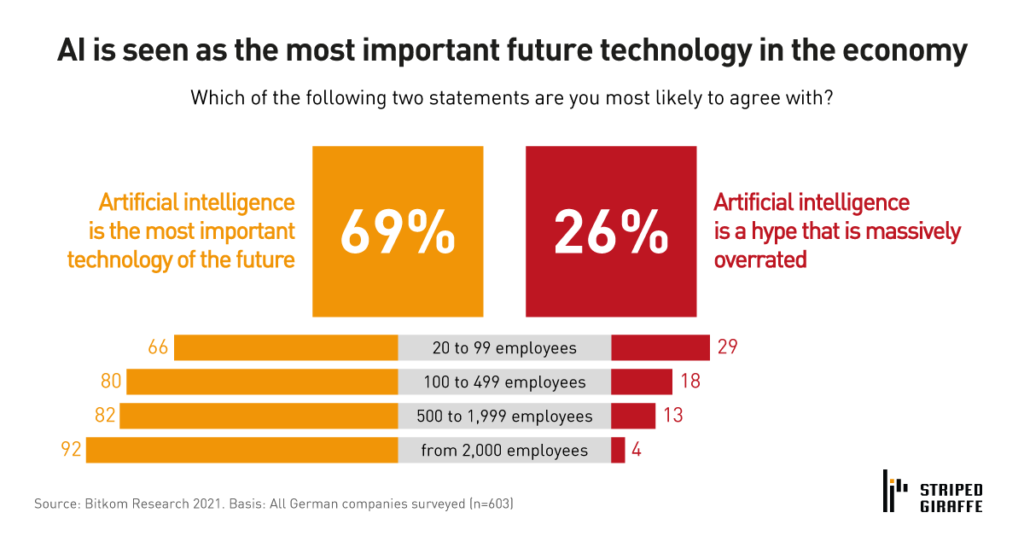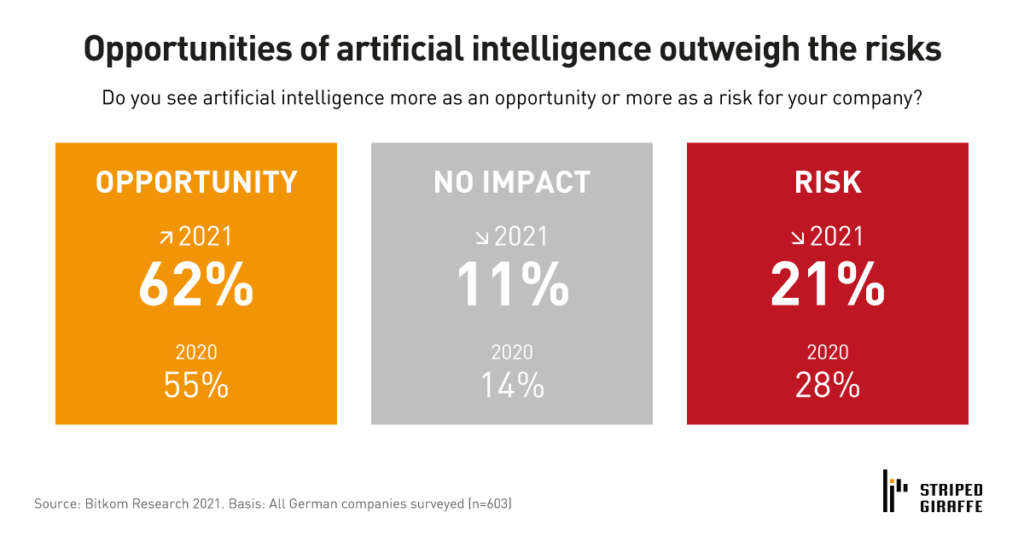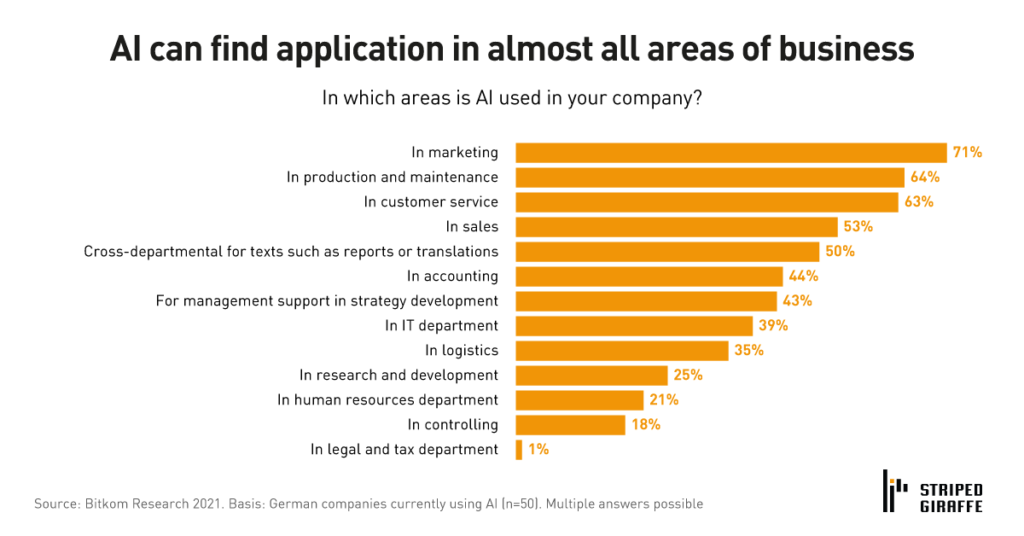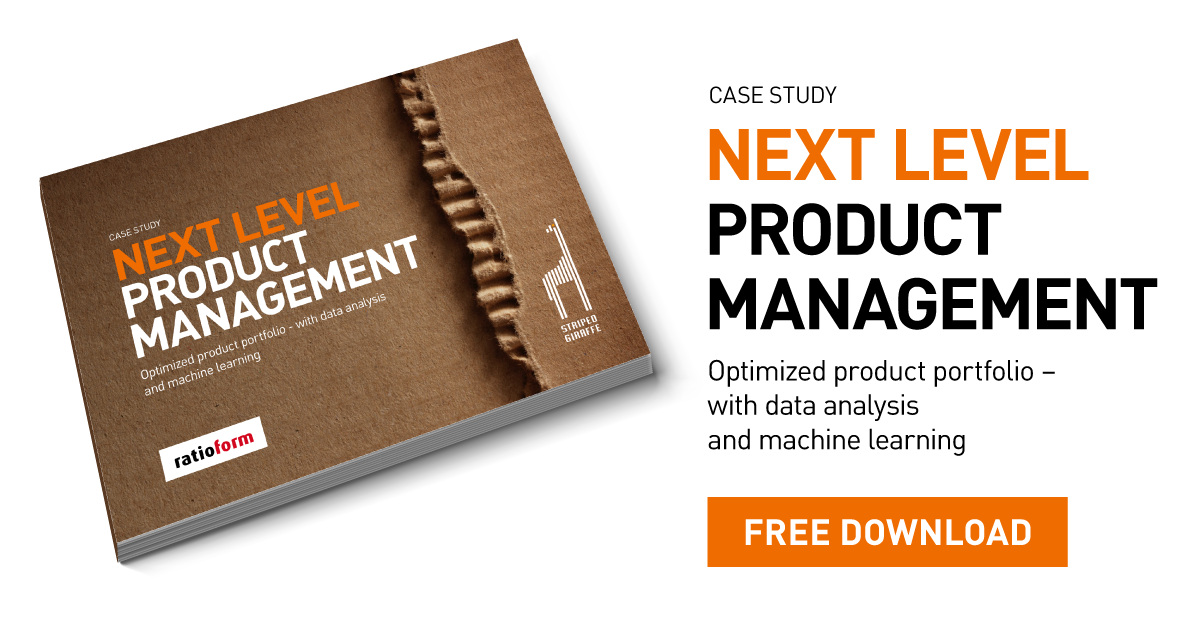
More German companies see opportunities in artificial intelligence
Nearly 70 percent of German companies believe artificial intelligence (AI) is a key technology of the future, according to the latest Bitkom study. Compared to previous years, an increasing number of organizations see AI as an opportunity for their own business. Not surprisingly, the percentage of those using AI applications or planning to invest in the technology is steadily growing.
Artificial intelligence is today evolving faster than expected, finding constantly new use cases across all industries and in every aspect of business, including marketing, sales, human resources, logistics, procurement, accounting and finance. This advancement would not be possible if not for the exponential growth of data volumes in recent years, accompanied by the rapid development of data collection, storage and processing technologies as well as the tremendous increase in computing power.
Artificial intelligence is a broad field of science encompassing a number of smart technologies with machine learning, deep learning, and natural language processing at the forefront. In fact, many of the applications of artificial intelligence have to do with machine learning solutions. The truth is, machine learning is the foundation of most AI systems.
The benefits of applying AI to business operations are undeniable. With enough data, AI can bring tremendous business value, especially when it comes to recognizing patterns and predicting behavior, which is one of the keys to effective decision-making.
Organizations that have successfully implemented this technology in various areas of their operations have experienced many positive outcomes, including:
- Increased efficiency and productivity due to AI’s ability to perform certain tasks at a pace and scale that humans cannot match
- Better decision-making with previously undiscovered insights provided by AI processing of massive amounts of data
- Intelligent automation of repetitive tasks since AI is better than humans at performing routine and predictable activities, such as data collection and processing
- Greater customer experience with AI’s ability to identify patterns in customer behaviors and decision-making to predict what their next steps and needs are likely to be
- Reduction in human error by minimizing human involvement in certain processes andas well as automating of repetitive and rule-based tasks
- Enhanced monitoring of processes, machinery, tools, inventories, etc., for example, early fault and defect diagnosis thanks to AI analyzing data gathered from sensors placed on the factory equipment
- Improved customer service and support, for example, by using AI-based chatbots that provide 24/7 service and automate communication with customers
- Streamlined recruitment process by having AI help quickly sift through applications, reject those that don’t meet the requirements, and identify top-tier candidates
- Effective fraud detection with the ability to compare millions of transactions and accurately distinguish between legitimate and fraudulent ones
- and many more.
Despite numerous benefits AI is still in the early stages of adoption by most organizations. But this seems to be changing as more and more organizations recognize the disruptive importance of artificial intelligence not only for the global economy but also for their own businesses. Let’s take a closer look at how companies in Germany, one of the world’s largest economies, see and leverage AI and its component technologies.
The most promising technology for the economy
The digital association Bitkom investigated how German companies perceive artificial intelligence, and whether and how they already use it or are planning to do so. For this purpose, Bitkom surveyed over 600 companies from all sectors of the economy.
Fig. 1 — Most German companies consider artificial intelligence to be the most important future technology in the economy
The results show that more than two-thirds of companies (69 percent) consider artificial intelligence to be the most important future technology in the German economy. On the other hand, only about one in four companies (26 percent) think AI is just a hype that is massively overvalued. As you might expect, the larger a company is, the better its attitude toward artificial intelligence (Fig. 1).
“This isn’t surprising. In large companies, especially at the enterprise level, there are naturally many more areas where artificial intelligence can find practical application and bring tangible benefits.” — says Franz Lingner, Project Manager at Striped Giraffe. “Besides, implementing AI is quite a technical challenge, requiring significant resources. Large organizations have greater budgets and other assets needed to adopt this technology. All this results in a much higher understanding and acceptance of artificial intelligence.”
Opportunities outweigh risks
The survey also revealed that more and more companies are recognizing that their businesses can benefit from artificial intelligence. 62 percent of executives surveyed said AI offers opportunities for their own companies. That is a significant increase from 2020, when only 55 percent of respondents expressed that opinion (Fig. 2).
There was also a significant drop in the percentage of those who see AI primarily as a threat. Today, only 21 percent of German companies see the technology as a risk (compared to 28 percent in 2020).
Fig. 2 — The majority of German companies see artificial intelligence as an opportunity rather than a risk
Lots of plans and talks, little action and investment
Unfortunately, the positive shift in attitudes towards artificial intelligence has not translated into a significant increase in the number of businesses utilizing this technology. According to the survey, AI applications are now used in only 8 percent of German companies, compared to 6 percent a year ago.
On a more positive note, the share of companies that are planning or talking about leveraging artificial intelligence has increased from 22 percent in 2020 to 30 percent today. Accordingly, the percentage of companies that are not considering AI at all has dropped from 71 to 59 percent.
Still, it looks like the situation will not improve considerably this year. Of all companies surveyed, only 8 percent said they will invest in artificial intelligence during 2021. A further 16 percent plan such spending only for next year or later. On the other hand, as many as 57 percent of German companies claimed that they have never invested in AI and do not plan to do so in the future.
Many business areas can benefit from AI
The study also examined what artificial intelligence is used for in the German companies that have already implemented this technology (Fig. 3).
The vast majority of AI applications used by German companies are for marketing (71 percent), mainly personalized advertising. 64 percent of businesses use AI to improve internal processes in production and maintenance. Almost as many involve AI in customer service (63 percent), for example in the automated answering of queries. About one in two companies employs AI to analyze customer behavior in sales (53 percent) or across departments to prepare texts such as reports or translations (50 percent).
Fig. 3 — Business areas where German companies are using artificial intelligence-based solutions
44 percent of companies use AI in accounting, for example for automated bookings. 43 percent leverage AI for management support, including strategy development. Various AI-based solutions have also been introduced in IT (39 percent) and logistics (35 percent), for example for better route planning.
The survey found that artificial intelligence is less frequently utilized in research and development (25 percent) or in human resources (21 percent), for instance for pre-selection of candidates. 18 percent use AI to detect risks in the company, for example in controlling. Very rarely are AI applications implemented in legal and tax departments (1 percent).
Practical use cases are promising
“In the German economy, we can find numerous examples of companies which have been successfully using and developing solutions based on artificial intelligence” — says Franz Lingner. “One of the leaders in this field is the BMW Group, which in 2018 established a ‘Project AI’ competence center for data analytics and machine learning to ensure that knowledge and technology are shared efficiently across the company.”
Currently, the BMW Group is using a number of AI applications in production and logistics. For example, in the production system, AI applications are used to recognize and classify objects in images. This ensures that all vehicles are built in the customized configuration as ordered and that all components are in flawless condition.
Retailers are also increasingly willing to benefit from solutions based on artificial intelligence. Here, the most obvious use cases for AI are customer experience personalization and product recommendations. However the potential applications of AI in retailing are much broader, as evidenced by the recent example of the Schwarz Group, owner of Lidl and Kaufland.
In the first quarter of 2021, the Schwarz Group announced that it has opened two fully automated stores without any staff or cash registers. This way, the company is testing new supermarket concepts, which have been named store.box and shop.box.
The store.box concept is designed to reflect the traditional shopping experience. It is an autonomous convenience store, equipped with an innovative system of sensors that record what products the customer has picked up from the shelf. Payment is made automatically via a mobile app as the customer leaves the store.
The collect.box concept is a bit different and resembles more of a vending model. The customer must order the products in advance via a terminal or mobile app. The order is then automatically completed and delivered to a special dispenser, from where the customer can collect it.
Both solutions were facilitated by artificial intelligence, which is responsible for controlling replenishment and assortment. With the help of AI, the high-tech store is even able to recognize when a product has been put back on the shelf.
Another recent example of how German companies are leveraging artificial intelligence is a Product Lifecycle Advisor, which Ratioform Verpackungen is using to predict performance and plan the development of its products.
“The machine learning-based solution allows Ratioform to keep an eye on all products in their respective product lifecycle phase. Thus, the time-consuming, manual efforts could be reduced considerably” — explains Franz Lingner, who managed this project on behalf of Striped Giraffe.
Thanks to the solution, Ratioform product managers have continuous insight into the best and worst performers from their extensive product portfolio. In addition, by predicting the future development of products, they can take action in advance.
“For example, the product manager may check whether a specific marketing or bundle initiative could prevent an item from drifting into the next stage of the product lifecycle” — Lingner explains.
Companies usually rely on experts
Many companies, especially small and medium-sized ones, still see artificial intelligence as an abstract technology and its implementation as very complicated and only feasible with support from experts. So it is not surprising that only a few companies decide to develop such a solution on their own. The vast majority call on experienced partners for support.
This is confirmed by the Bitkom study. It has found that only 3 percent of German companies, which are already using AI or plan to do so, create such solutions independently and without any support. Almost half of the organizations (48 percent) develop and program AI applications together with external partners, mostly from Germany (71 percent). In addition, 6 in 10 companies surveyed (57 percent) buy or rent AI applications from third-party providers, also mainly from Germany (46 percent).
In most cases, the assistance of an experienced partner is crucial for project success and to achieve measurable results in a relatively short period of time. So, if the main reason for not using artificial intelligence is a lack of resources and competence, it really makes sense to reach out to an external service provider and at least get advice on potential opportunities.






